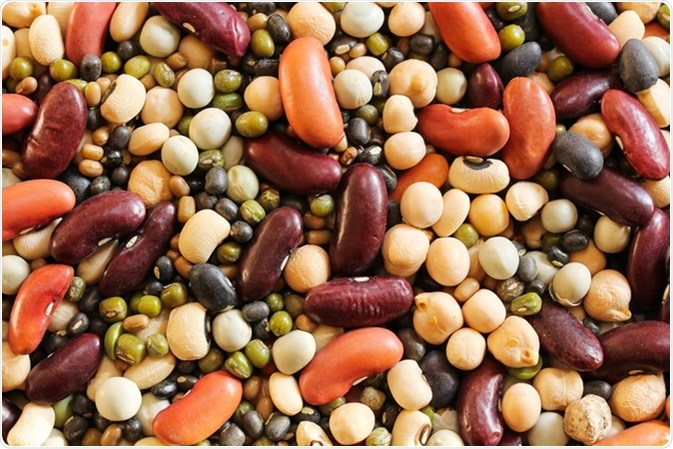Butyrate and propionate are two important short-chain fatty acids (SCFAs) produced in the human gut. They have been shown to have significant immune system effects in the intestinal mucosa, by inducing the differentiation of T-regulatory cells via inhibition of histone deacetylase (HDAC). This enzyme keeps chromatin from unwinding and, therefore, inhibits gene transcription.
As a result, HDAC inhibitors such as butyrate can have an anti-proliferative effect. In addition, they can modulate cell adhesion, cytokine production, chemotaxis and immune cell migration, as well as COX-2 upregulation.
All these effects result in an anti-inflammatory action, accounting for its potential role as a colorectal cancer suppressor. This helps to preserve an intact epithelial barrier, which is key to preventing inflammatory bowel disease and colorectal cancers.

Legume rich diet promotes short chain fatty acids, BMJ DOI: 10.1136/gutjnl-2015-309957 - Image Credit: vm2002 / Shutterstock
Overeating and Metabolic Disorders
It is established that chronic overeating promotes adipose tissue hypertrophy. This increases the concentration of inflammatory chemicals such as monocyte chemoattractant protein-1 (MCP-1) and eventually results in adipose tissue infiltration by immune cells, notably macrophages, which are a major source of pro-inflammatory chemicals. Thus, there is a higher level of inflammatory chemicals in the systemic circulation. This is signaled by an increase in markers such as C-regulatory protein and tumor necrosis factor-alpha (TNF-a).
When people at risk of certain abnormal inflammatory responses are subjected to repeated high levels of these mediators, chronic inflammation sets in with its sequelae, such as diabetes mellitus, insulin resistance, or atherosclerosis.
These increases in pro-inflammatory molecules happen with every meal rich in fat, or in quickly digested and absorbed carbohydrates (which is also converted to fat). Thus dietary factors play a fundamental role in the genesis of many immunological disorders which underlie a host of other medical conditions.
Dietary Fiber
The dietary intake of fiber lowers the concentration of inflammatory markers and mediators such as circulating CRP and IL-6.
Galacto-oligosaccharides and fructo-oligosaccharides have been shown to modulate the production of several cytokines, thus increasing or decreasing the level of inflammation in the body.
A meal rich in non-digestible fiber can arrest the normal post-prandial rise in IL-6 and TNF described above, probably because of the synthesis of SCFAs from fermented fiber.
G-Protein Coupled Receptors
Again, SCFAs may act via G-protein coupled receptors (GPR) on immune cells. Different GPR-41 and GPR-43 are expressed variously on different types of immune cells, in lipid-rich adipose cells, and in bone marrow or spleen.
In obese female subjects, GPR is overexpressed in subcutaneous tissue as compared to omental cells. SCFAs activate these receptors but different SCFAs have a varying potency of activation.
Cell adhesion and Chemotaxis
SCFAs also seem to stimulate chemotaxis of neutrophils even without any other stimulator. They inhibit the expression of several cell adhesion molecules such as VCAM-1, via TNF-a and interleukin-1b.
Butyrate also prevents the expression of ICAM-1 and of other lymphocyte-associated antigens which are required for cell adhesion, thus suppressing the activation of antigen-presenting cells (APC). This may also affect costimulatory molecules, which in turn also regulates T-cell activation. It is now hypothesized that SCFAs also help modulate the Th1:Th2 ratio, which regulates the immune status.
SCFAs also regulate powerful local hormones such as monocyte production of cytokines and prostaglandins. Whether the SCFA, especially butyrate, in any given situation produces an inflammatory or anti-inflammatory effect depends on the state of the immune cells, whether they are actively proliferating or differentiating.
In general, SCFAs induce tolerance via direct effects on the T-regulatory lymphocyte activation and effector responses, as well as through the effects on the activation and differentiation of other primary immune cells, such as dendritic cells and macrophages.
Reduced chemotaxis and cell adhesion lead to a systemic anti-inflammatory effect, which has a beneficial effect on inflammatory disorders.
Effect on Colonic Enterocytes
Butyrate has multiple effects on the lifecycle of the colonic cell, causing proliferation or apoptosis depending on the concentration of the SCFA. This helps to renew the colonic mucosal lining.
Overall, SCFAs seem to play a pivotal role in inflammation and may help to prevent and treat many metabolic disorders associated with systemic inflammation and obesity.
As there are clues that inflammation associated with obesity may be mediated by antigens, and given that butyrate has been demonstrated to induce T-cell anergy, SCFAs may be good candidates to assess in the fight with systemic and obesity-associated inflammation.
References
Further Reading
Last Updated: Feb 27, 2019